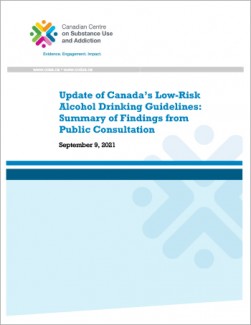Update of Canada’s Low-Risk Alcohol Drinking Guidelines: Summary of Findings from Public Consultation

The Canadian Centre on Substance Use and Addiction (CCSA) has released Updating Canadian Low-Risk Alcohol Drinking Guidelines: Summary of Findings from Public Consultation. This report marks an important phase in the process of updating Canada’s Low-Risk Alcohol Drinking Guidelines (LRDGs).
In spring 2021, CCSA held an online public consultation to understand the experiences of people in Canada with the current Low-Risk Alcohol Drinking Guidelines and their needs and expectations for updated guidelines.The consultation was open to all people in Canada, including the public, professionals and representatives from organizations with an interest in alcohol, health and well-being.
The majority of the 4,809 submissions received were from people who self-identified as members of the general public. Key findings of the consultation include:
-
More than 60 per cent of contributors said they were not aware of Canada’s LRDGs, meaning that sustained efforts across the country will be required to inform the population about the updated LRDGs.
-
Among those who said they were aware of the LRDGs, two-thirds said they used them, mainly to assess their consumption and check if they were drinking too much alcohol.
-
Those who said they used the LRDGs noted challenges, the most frequently cited one being “not wanting to follow the LRDGs.” This highlights the need for public education on the risks and benefits of drinking alcohol and for guidelines to help people make informed decisions about alcohol consumption.
-
Eight out of 10 contributors suggested the impact of drinking alcohol on mental health should be prioritized in the updated LRDGs.
-
The majority said the updated LRDGs should help them “to reduce their risk of experiencing alcohol-related harms” and “improve their knowledge about alcohol-related risks and benefits.”
The results of the public consultation will inform the development and communication of updated LRDGs.